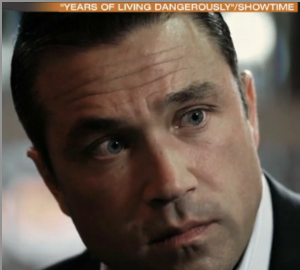
The Showtime program Years of Living Dangerously, which is now partly through its first and—given its low ratings—possibly only season, blends celebrity star power with insights and investigations into climate change. As to whether the show is able successfully to motivate people to take action on climate change, it is too soon to say.
The first episode, which we previewed before the show debuted, received strong reviews, and last weekend, perhaps in response to the low ratings, the first four episodes were made available for free. In my household, being one of the 25% of cable watchers who subscribe to Showtime, we’ve watched three of the four episodes, which featured former California Governor Schwarzenegger with a hot-shot crew battling wildfires in Idaho, and Olivia Munn learning about plans to ship U.S. coal to China. Upcoming episodes will feature Matt Damon, Jessica Alba, and America Ferrera.
But it was MSNBC’s Chris Hayes’s interview with Staten Island Congressman Michael Grimm in episode three that caught our attention, in part because of the awkward timing.
The show aired on April 27 and made a big deal about how Grimm had converted from being a skeptic on climate change to taking it seriously. The next day, Grimm, a former Marine and FBI agent, was indicted on federal fraud charges after a two-year investigation and is now facing a 20-count indictment on underreporting wages and revenue of an Upper East Side restaurant. Oops.
The story of Grimm being a prominent conservative GOP congressman who “converted” from being a skeptic to accepting climate change science was starting to gain traction…until the indictment sucked the wind out of those sails. Grimm had been in the news a few months before for threatening to throw a reporter off a balcony, so he clearly has some issues that made him a questionable poster child for climate conversion.
How did Grimm become the focus of the episode? Hayes had been following up on the impact of Superstorm Sandy on Staten Island, where 24 people perished, and latched onto Congressman Grimm as he tried to push for federal funding to support relief in Staten Island.
The human interest angle was compelling, and, knowing that Grimm didn’t think human activities had anything to do with changing climate, Hayes put Grimm in touch with former South Carolina Congressman Bob Inglis of the Energy and Enterprise Institute (E&EI) at George Mason University to see if he’d change his mind.
Inglis chaired the House Subcommittee on Research that I testified in front of in 2006 to encourage Congress to support science education. Deeply conservative and an Evangelical Christian, he made a strong impression on me when I met him, especially after he told the story of how, after prodding from his family to take climate science more seriously, he went to Antarctica with Senators McCain and Collins to meet with climate scientists. He came back convinced the scientists knew what they were talking about.
To make a long story short, Inglis was beaten in a primary because of his stance on climate change, which then led to his establishing the E&EI at George Mason.
In his follow-up segment on MSNBC entitled “Michael Grimm’s blasé approach to climate debate,” Hayes said that his conversation with Grimm about why nothing is being done in Congress and will never get done about climate change was “hands down the most honest I have ever seen a sitting member of Congress be about politics while the camera was rolling.”
In the Showtime clip, Grimm grimly states that Congress has no appetite to take on another challenge or work together, that they only want to talk about immigration or taxes. Moreover, he said “humans in America” just don’t have the will to deal with climate change. “Do you think my generation or the generation after me has that? I think you are living in fantasyland. They don’t! They don’t!”
Hayes, acknowledging what a depressing thought this is, goes on a rant about how history harshly judges those who don’t rise to the biggest challenge of their times, confronting and in effect judging Grimm for not rising to the challenge himself.
Naturally, when it comes to the federal charges against Grimm, he’s technically innocent until proven guilty. But Grimm seems to think the verdict—on Americans tackling climate change--is already in: we won’t.
I’m not so pessimistic. I’d like to think that if we “humans in America” muster the will to take climate change seriously—and especially if we commit to ensuring that the next generation attains scientific literacy with respect to climate and energy—that we will yet be able to overcome the challenges that climate change poses.
